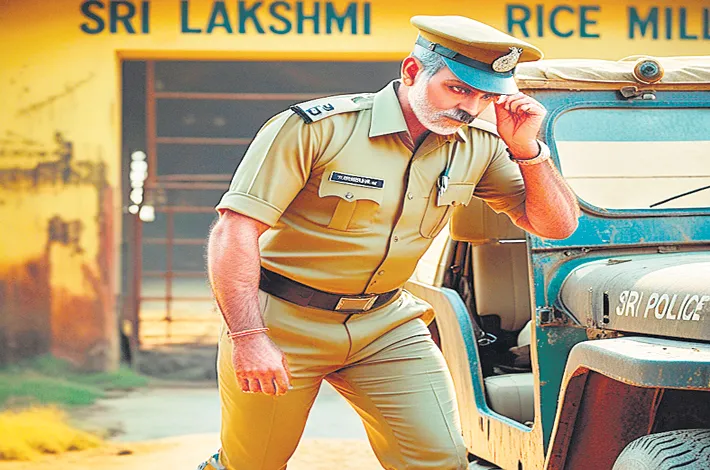Murder in Kamareddy
03-04-2025 12:00:00 AM

By nightfall, the station buzzed with activity. Vikram sat at his desk, a flickering bulb overhead, sifting through Ramesh’s ledger—names, debts, threats scrawled in Telugu. One entry stood out: K. Shankar, 5 lakhs, due last week. Shankar was a small-time chili farmer, quiet, unassuming. Vikram had seen him at the market, head bowed, selling his crop. Could he have snapped?
The sun dipped low over Kamareddy, casting long shadows across the cracked streets lined with banyan trees and modest shops. The air was thick with the scent of roasted peanuts and diesel fumes, a familiar hum of life in this small Telangana town. But beneath the surface, something darker simmered.
Inspector Vikram Reddy adjusted his khaki cap as he stepped out of the police jeep, his boots crunching against the gravel outside the old rice mill on the town’s outskirts. The call had come in an hour ago—anonymous, frantic, and cut off mid-sentence. A body, the voice had said, near the mill. Vikram’s gut told him this wasn’t a routine case. Kamareddy wasn’t Hyderabad; murders here were rare, personal, and messy.
The mill loomed ahead, its rusted tin roof sagging under years of neglect. A crowd had already gathered—shopkeepers, farmers, and curious kids—whispering among themselves. Vikram pushed through, his constable, Anil, trailing behind with a notepad. The smell hit him first: metallic, sharp, unmistakable. Blood.
In the shadow of a broken conveyor belt lay a man, face down in the dirt. His white kurta was stained crimson, a jagged tear across his back. Vikram crouched, tilting his head to study the scene. No weapon in sight, but the wound suggested a machete or something equally brutal. He recognized the man instantly—Ramesh Goud, a local moneylender known for his ruthless interest rates and even nastier temper.
“Anil, cordon this off,” Vikram barked. “And get these people back. Now.”
As Anil scrambled to obey, Vikram’s mind raced. Ramesh had enemies—plenty of them. Farmers who’d lost land to his loans, traders he’d strong-armed, even whispers of a mistress or two. But this wasn’t a crime of passion; the precision of the strike felt calculated, cold.
By nightfall, the station buzzed with activity. Vikram sat at his desk, a flickering bulb overhead, sifting through Ramesh’s ledger—names, debts, threats scrawled in Telugu. One entry stood out: K. Shankar, 5 lakhs, due last week. Shankar was a small-time chili farmer, quiet, unassuming. Vikram had seen him at the market, head bowed, selling his crop. Could he have snapped?
The next morning, Vikram drove to Shankar’s farm, a patchy stretch of red soil dotted with wilting plants. Shankar was there, hoe in hand, sweat beading on his brow. He froze when he saw the jeep.
“Shankar,” Vikram said, stepping out. “We need to talk about Ramesh Goud.”
The farmer’s eyes darted to the ground. “I heard he’s dead. Good riddance.”
“Where were you yesterday evening?”
“Here. Working.” Shankar’s voice was steady, but his grip on the hoe tightened.
Vikram pressed him, but Shankar stuck to his story. No alibi, no witnesses—just a man alone with his fields. Suspicious, but not enough to hold him. Yet.
Back in town, rumors swirled. Some said Ramesh had crossed a Hyderabad gang, others pointed to a jilted lover. Vikram’s phone buzzed—a text from Anil: Found something. Mill. He sped back, arriving as dusk painted the sky orange.
Anil held up a plastic bag, triumphant. Inside was a blood-streaked machete, half-buried near the mill’s back wall. “Prints are faint, sir, but we’ll run them.”
Vikram nodded, but his attention snagged on something else—a faint tire track in the dust, too wide for a bike, too narrow for a truck. A tempo, maybe. Shankar didn’t own one, but someone in Kamareddy did.
The breakthrough came at midnight. A tip from a tea stall owner: he’d seen a tempo parked near the mill the previous evening, driven by a woman. Vikram’s mind clicked—Latha, Ramesh’s mistress, owned a tempo for her vegetable business. She’d been quiet when questioned earlier, claiming she hadn’t seen Ramesh in weeks.
Vikram stormed her house, a squat building near the bus stand. Latha answered the door, her saree disheveled, eyes wide. “What now?”
“Where’s your tempo?” Vikram demanded.
“In the shed. Why?”
He didn’t answer, brushing past her to the backyard. The tempo sat there, mud-caked tires matching the mill’s tracks. A quick search turned up a stained rag under the seat—blood, still damp.
Latha’s composure cracked. “I didn’t mean to! He was going to ruin me—said he’d tell my husband everything unless I paid him double!”
“So you hacked him?” Vikram’s voice was ice.
“It was an accident! I swung to scare him, but…” She crumpled, sobbing.
Vikram cuffed her, the case closed but the town forever changed. Kamareddy’s quiet streets hid secrets, and he knew this wouldn’t be the last. As he drove back to the station, the night swallowed the town, leaving only the echo of a killer’s regret.








